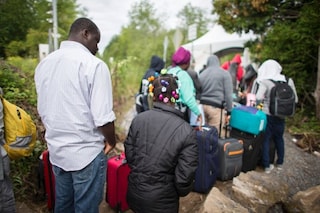Canada Rejects 1,596 Nigerian Asylum Seekers In One Year

In a recent report, the Immigration and Refugee Board (IRB) of Canada revealed that 1,596 asylum claims filed by Nigerians were rejected in the first part of 2025.
According to the data, out of 3,548 claims submitted, 2,292 were approved, representing a 65% acceptance rate.
The high rejection rate has raised concerns among human rights groups and advocates for asylum seekers.
Imaobong Ladipo-Sanusi, Executive Director of the Women Trafficking and Child Labour Eradication Foundation, attributed the rejections to poor documentation and irregular entry into Canada.
“Most times, many Nigerians miss it when they don’t understand the laws governing refugee status as adopted in their chosen destination,” she said.
The surge in Nigerian asylum claims is attributed to worsening insecurity driven by Boko Haram and severe economic hardship in the country.
Many Nigerians are seeking refuge in Canada, hoping to escape the violence and poverty that has plagued their homeland.
According to the IRB report, Ontario and Alberta currently host the largest numbers of asylum seekers.
In 2024, Canada recorded a record 173,000 asylum claims, with applications easing slightly in 2025 but remaining far above pre-pandemic levels.
Canada grants refugee protection to individuals who meet the UN definition of a convention refugee or face credible risks of torture, persecution, or inhumane treatment in their home country.
Vulnerable groups, including women, LGBTQ+ individuals, and people living with HIV/AIDS, are often prioritized for refugee status.
The rejection of Nigerian asylum seekers is not a new phenomenon. Between 2013 and 2024, Canada rejected 13,171 asylum claims from Nigerians while approving 10,580.
The highest rejection figure came in 2019, with 3,951 cases denied. In 2024 alone, 811 Nigerian applications were rejected against 2,230 approvals.
The IRB report highlights the challenges faced by asylum seekers in Canada, particularly those from Nigeria.
While some are granted refugee status, many others are rejected, leaving them uncertain about their future.



